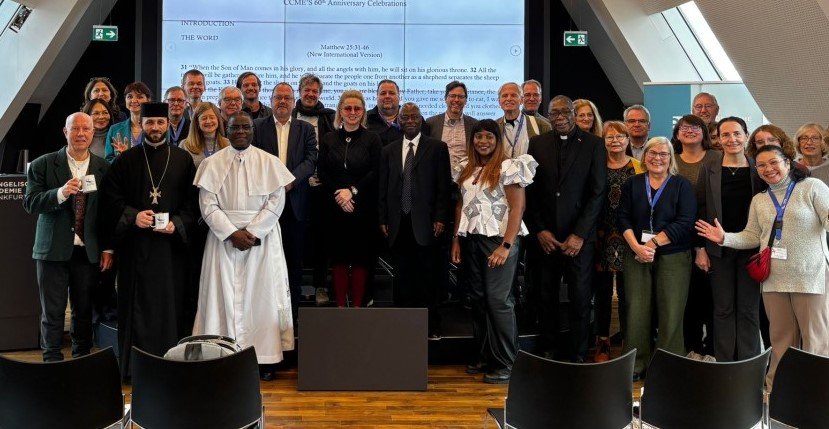From December 2–4, 2024, the Churches' Commission for Migrants in Europe (CCME) gathered in Frankfurt to celebrate its 60th anniversary. Under the theme “Europe Protecting People More than Borders,” the conference brought together over 60 representatives from member organisations, ecumenical partners, and migration experts to reflect on CCME’s legacy and chart a course for the future of migration and asylum policy in Europe.
Emma Perry, Global Mission Intern, our colleague at RCH's Ecumenical Office and the Refugee Ministry represented our Church.

Reflecting on 60 Years of Advocacy
The event opened with a keynote by Bishop Prof. em. Heinrich Bedford-Strohm, who reminded attendees of the profound importance of human dignity and human rights in addressing migration issues. This theme was further explored in a panel discussion featuring past and present CCME leaders, who shared insights on six decades of commitment to protecting migrants and refugees.
Among the anniversary celebration and highlights, participants were introduced to a commemorative booklet on CCME’s history, which captures key milestones and testimonies from its work.
Panels on Key Migration Themes
Discussions delved into pressing challenges and opportunities in Europe’s migration landscape: presentations from Finland and Switzerland examined policies that shape the everyday lives of migrants and refugees. In Finland, anti-immigration rhetoric and restrictive border policies were contrasted with strong ecumenical collaboration, where churches work together to foster hope and solidarity. In Switzerland, innovative integration measures, such as linking vocational education with labour market needs, were highlighted alongside challenges like housing shortages and restrictive temporary admissions.
Presentations from the UK and the Netherlands critically assessed externalisation strategies, such as the UK’s failed Rwanda Asylum Plan and Dutch proposals for relocation hubs in Uganda. Both policies sparked ethical debates and highlighted the need for fair, rights-based solutions. Churches have played a pivotal role in opposing these measures, emphasising moral responsibility and advocating for safe, legal pathways for migration.
Representatives form Italy, and Germany shared models for integrating labour migrants, noting successes in sectors like agriculture while raising concerns about policies prioritising employer needs over refugee protection. Italy’s ethical initiatives, such as the Orange campaign in Italy, showcased how fair labour practices can benefit both workers and local economies.
Challenging Myths and Narratives
Dr. Torsten Moritz, CCME General Secretary, led a session debunking persistent myths about migration, such as the notion that migrants are drawn solely by economic benefits or that externalised policies effectively deter migration. Participants discussed the need for nuanced narratives, using both data and personal stories to counter misinformation and promote understanding.
Churches’ Commitment to Action
The conference focused significantly on how churches can contribute to creating humane migration policies. Panellists with migration backgrounds shared their experiences, emphasising the need to shift from viewing migrants as “objects” of assistance to recognising them as active contributors to society and the church.
Participants also visited the Evangelisches Zentrum für Beratung Am Weißen Stein in Frankfurt, a church-run centre providing direct support to refugees and migrants. This practical exposure reinforced the conference’s call for solidarity and concrete action.
Outcomes and Future Directions
The conference concluded with a service of thanksgiving and commitment, led by Rev. Dr Arlington Trotman, affirming CCME’s dedication to advocating for an asylum system centred on solidarity and human rights. A task force under the theme “Protecting People More than Borders” will continue exploring alternatives to current migration policies. A discussion paper detailing these proposals will be shared in January 2025.
Looking ahead, CCME announced several key initiatives
In March 2025, the 2nd Africa-Europe Ecumenical Forum on Migration will meet in Addis Ababa, focusing on externalisation, migration agreements, and the role of the African Union.
In addition, there will be an Advocacy training in Brussels in the early summer of 2025 in May or June, equipping members to influence the national implementation of EU migration policies.
The European Asylum Conference will meet in Spain in October 2025 to address asylum trends and foster collaboration among CCME members.
As CCME marks 60 years, it remains steadfast in its mission to defend the dignity and rights of migrants and refugees while challenging policies that prioritise borders over people. The Frankfurt conference was a celebration of past achievements, and a powerful reminder of the work still needed to build a more just and humane Europe.
Churches Together for Roma and Sinti
CCME Cooomunique about the Conference ‘Justice for Roma and Sinti: a challenge for churches’ that took place in the Synod Hall of RCH co-hosted by CCME and RCH.